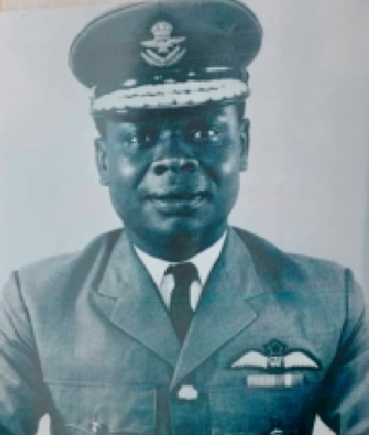
Air Vice-Marshal Ashley-Lassen — A Pillar
Air Vice-Marshal Ashley-Lassen was an Officer and a fine gentleman.
The kind that has almost disappeared from Ghana now, and whose like we may never see again.
He was one of the first-generation stars of Kwame Nkrumah’s Air Force – which commenced during a period of transition and turbulence.
Through it all, he managed to maintain discipline, good humour, quick wit and a resilience to glide through storms and touch down safely just where the heavenly hosts intended he should land.
Primary education
He started his primary school education in Port Harcourt, Nigeria, completed secondary school at Zion College, Anloga, and commenced his military training at Burma Camp.
His training took him through courses at the Regimental Training School, Bantama, Kumasi, the Regular Officer Special Training School at the Teshie Military Camp, the Royal Military Academy, Sandhurst, Berkshire, and the Royal Artillery Officers’ training course, Larkhill, Wiltshire.
He was commissioned as a Second Lieutenant in the Ghana Army in December 1958,
On his return, he was posted as a Troop Commander to the Ghana Artillery and later seconded to the Ghana Air Force in March 1959. He trained at the Ghana Air Force Flying Training School, Takoradi, the Royal Air Force Staff College in Bracknell, Berkshire, the Royal Air Force Staff College, Andover, Hampshire, and the National Defence College, New Delhi.
At various times, he was Platoon Commander of the 1st Ghana Regiment, Officer Commanding Number 2 Squadron, Air Force Station, Takoradi, Commanding Officer, Air Force Station, Accra, Acting Commander and then Commander of the Ghana Air Force and the Chief of Defence Staff.
Suffice it to say that at every turn of Ashley-Lassen’s military career, his sharp thinking, courage and willingness to adapt were evident.
He was diligent, energetic, amiable, pragmatic, open-minded, respectful, disciplined, principled and of integrity and guts.
These qualities, and a fair few more, were what drew me to him when we were both recruited to serve in the NRC Government of Colonel Acheampong: Ashley-Lassen as Commissioner for Special Duties and I as the Special Assistant to the Head of State on Finance – the de facto Commissioner for Finance.
Immediately after the 1972 coup d’état, Colonel Acheampong repudiated austerity measures and repayment plans for Ghana’s foreign debts agreed to by the Busia-led government he had overthrown.
Workers, intellectuals, youth groups, professionals and market women hailed the yentua policy.
Euphoria swept across the country and lives were infused with optimism.
Within a year, however, the confidence had evaporated, the economy was in distress, with high unemployment, runaway inflation and lax import controls.
The 1973 OPEC oil crisis and soaring prices of petroleum products caused a debilitating shortage of foreign exchange. Hoarding and profiteering became ugly facts of everyday life.
Faced with the signs of meltdown, the Government reversed its policy on foreign debt, deciding to return to the negotiating table and face international creditors.
A nine-member delegation was appointed to meet and discuss the nation’s case with the International Monetary Fund (IMF) in Rome.
The delegation was led by Air-Vice Marshall Ashley-Lassen, with me, Dr Kwame Donkoh Fordwor, as the deputy leader.
Naturally, the leader of a delegation representing the military regime had to be a man from the Armed Forces.
After tough negotiations in Rome with creditors, two options were laid before the Ghana team.
The first option appeared favourable for Ghana, but after careful consideration, I gave a presentation touting the second option as most favourable.
Ashley Lassen’s careful evaluation and judgement, coupled with acknowledgement and support by Mr Roger Chaufonnier from the IMF for the second option, the delegation returned to Accra with a deal that bought Ghana precious room to manoeuvre at advantageous rates.
Leardership style
Ashley-Lassen grew increasingly critical of the Colonel’s clannish leadership style with time.
This led to his honourable release from the army in December 1974.
He left Ghana with his family for the United States, where he studied for a Master’s degree at the Stanford Graduate School of Business in California.
Colonel Achampong’s NRC went through a palace coup in July 1978 and in 1979.
Flt Lt. Jerry Rawlings and co-conspirators kicked out the government of senior officers and formed the Armed Forces Revolutionary Council (AFRC).
Ashley-Lassen returned to Ghana in July 1978 but was arrested by the AFRC after the coup in 1979 and held in Nsawam prison briefly.
He was later released and worked briefly for the AFRC.
He later joined Anglo Gold Ashanti, worked in East Africa and Zaire for ten years and lived out his later years peacefully in the Volta Region.
He died on November 24, 2024, at the 37 Military Hospital in Accra.
May the soul of this gallant Officer Rest in Peace.
